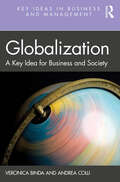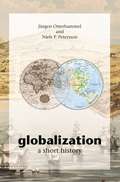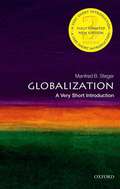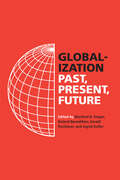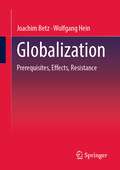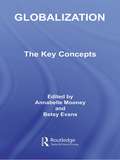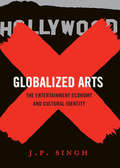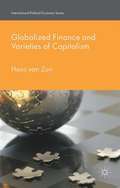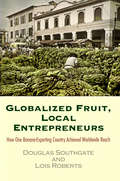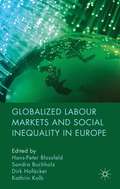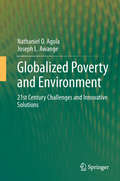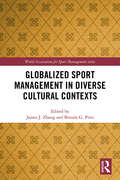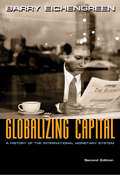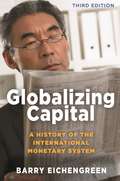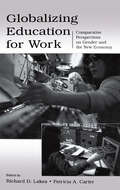- Table View
- List View
Globalization: A Key Idea for Business and Society (Key Ideas in Business and Management)
by Andrea Colli Veronica BindaGlobalization: A Key Idea for Business and Society analyzes today’s process of global integration. Globalization is seen as a complex phenomenon, the drivers of which are of a technological, institutional, cultural and, not least, political nature.The book includes a historical analysis of the rise, and fall, of the “first globalization” wave which took place between the end of the Napoleonic Wars and the Great War. The chapters focus on the measurement of the global integration process, on the in-depth analysis of the above mentioned “drivers”, and on some of the actors playing a relevant role in the process itself – multinational companies and governments as owners of global companies. The conclusion of the book provides a perspective on the current “globalization backlash”, its determinants and possible future alternative scenarios.This book is an ideal resource for students and practitioners interested in past, present and future globalization.
Globalization: A Short History
by Niels P. Petersson Jürgen Osterhammel"Globalization" has become a popular buzzword for explaining today's world. The expression achieved terminological stardom in the 1990s and was soon embraced by the general public and integrated into numerous languages. But is this much-discussed phenomenon really an invention of modern times? In this work, Jürgen Osterhammel and Niels Petersson make the case that globalization is not so new, after all. Arguing that the world did not turn "global" overnight, the book traces the emergence of globalization over the past seven or eight centuries. In fact, the authors write, the phenomenon can be traced back to early modern large-scale trading, for example, the silk trade between China and the Mediterranean region, the shipping routes between the Arabian Peninsula and India, and the more frequently traveled caravan routes of the Near East and North Africa--all conduits for people, goods, coins, artwork, and ideas. Osterhammel and Petersson argue that the period from 1750 to 1880--an era characterized by the development of free trade and the long-distance impact of the industrial revolution--represented an important phase in the globalization phenomenon. Moreover, they demonstrate how globalization in the mid-twentieth century opened up the prospect of global destruction though nuclear war and ecological catastrophe. In the end, the authors write, today's globalization is part of a long-running transformation and has not ushered in a "global age" radically different from anything that came before. This book will appeal to historians, economists, and anyone in the social sciences who is interested in the historical emergence of globalization.
Globalization: A Very Short Introduction (Third Edition)
by Manfred Steger'Globalization' has become one of the defining buzzwords of our time - a term that describes a variety of accelerating economic, political, cultural, ideological, and environmental processes that are rapidly altering our experience of the world. It is by its nature a dynamic topic - and thisVery Short Introduction has been fully updated for a third edition, to include recent developments in global politics, the global economy, and environmental issues. Presenting globalization in accessible language as a multifaceted process encompassing global, regional, and local aspects of social life, Manfred B. Steger looks at its causes and effects, examines whether it is a new phenomenon, and explores the question of whether, ultimately, globalization is agood or a bad thing.
Globalization: Past, Present, Future
by Manfred B. Steger, Roland Benedikter, Harald Pechlaner, and Ingrid KoflerA free ebook version of this title is available through Luminos, University of California Press’s Open Access publishing program. Visit www.luminosoa.org to learn more. Since the end of the Cold War, globalization—the process and the idea—has been reshaping the world. Global studies scholarship has emerged to make sense of the transnational manifestations of globalization: economic, social, cultural, ideological, technological, environmental, and postcolonial. But a series of crises in the first two decades of the twenty-first century has put the neoliberal globalization system of the 1990s under severe strain. Are we witnessing a turn toward "deglobalization," intensified by the COVID-19 pandemic and the war in Ukraine or a moment of "reglobalization," spearheaded by digital technology? The contributors to this book employ transdisciplinary research to assess past developments, the current state, and future trajectories of globalization in light of today’s dynamics of insecurity, volatility, and geopolitical tensions.
Globalization: Prerequisites, Effects, Resistances
by Joachim Betz Wolfgang HeinThis textbook deals with the progressive global dissolution of political, economic, and social boundaries, which has significant implications for labor markets, the international division of labor, social security, and income distribution. Politically, it is eroding the sovereign ability of nation-states to shape their own affairs; socially, it conjures up the specter of an increasingly global culture of unity. Against the background of the empirical effects of globalization processes in a number of areas, the book discusses to what extent these fears are justified, whether they cannot also be explained by other developments, and whether the benefits of globalization justify the costs and risks resulting from it.
Globalization: State of the Art and Perspectives (Routledge Frontiers of Political Economy #84)
by Stefan A. SchirmGlobalization is the first volume which systematically encompasses the debates and the results of research of political scientists on all core aspects of the interrelation between politics and economics in the process of globalization. This volume shows how research on globalization has reached a degree of differentiation and depth that makes it necessary and attractive to assess the state-of-the-art and perspectives for further research. With contributions from international experts including Andreas Busch, Nadine Haase and Edgar Grande.
Globalization: The Key Concepts (Routledge Key Guides)
by Annabelle Mooney Betsy EvansViewed as a destructive force or an inevitability of modern society, globalization is the focus of a multitude of disciplines. A clear understanding of its processes and terminology is imperative for anyone engaging with this ubiquitous topic. Globalization: the Key Concepts offers a comprehensive guide to this cross-disciplinary subject and covers concepts such as: homogenization neo-Liberalism risk knowledge society time-space compression reflexivity. With extensive cross-referencing and suggestions for further reading, this book is an essential resource for students and interested readers alike as they navigate the literature on globalization studies.
Globalization: The Return of Borders to a Borderless World?
by Richard W. Mansbach Yale H. FergusonWritten by two leading scholars of global politics, Globalization: the return of borders to a borderless world? is a major new book for students of globalization. It describes and explains globalization and its origins, and examines its future in light of key recent political and global trends and events. The text: identifies the different political, economic, technological, and cultural meanings of globalization examines its historical origins from the ancient past through the Cold War and into the twenty-first century describes the multiple attributes and consequences of globalization including its effect on the sovereignty of the nation state discusses recent trends such as the increased use of social media and events like the Arab Spring assesses the normative implications of globalization analyzes the challenges to globalization posed by contemporary events such as the global financial crisis. This book will be essential reading for all students of globalization, and will be of great interest to students of global politics and global governance.
Globalization: What's New
by Michael M. WeinsteinWith original contributions from ten eminent economists, this collection presents diverse and original perspectives on globalization. The contributors analyze recent trends in trade, immigration, and capital flows; why some poor countries have grown while others have stagnated during the past two decades; globalization's impact on jobs and wages in poor countries and in the United States; the surprising environmental benefits of globalization; the degree to which foreign aid helps developing countries; the failures of international institutions to govern the global economy and supporting democracy; and how foreign loans and investments can wreak havoc on a nation's economy.
Globalization: What's New? (Globalization And Community Ser. #54)
by Ed. Weinstein Michael M.From the streets of Seattle to corporate boardrooms to new factories in third-world nations, globalization is subject to very different and often explosively divergent interpretations. Where some see globalization as driving poor countries into further poverty, others see it as the path to economic salvation and democratic rule. With original contributions from ten eminent economists, Globalization: What's New cuts through the confusion and rhetoric to offer straightforward, incisive analysis of globalization and its future.Coming from some of globalization's most prominent supporters (David Dollar), its most vocal critics (Joseph Stiglitz), and those in-between, this collection presents diverse and original perspectives on globalization's immense reach that dig to the core of many debates. The contributors analyze recent trends in trade, immigration, and capital flows; why some poor countries have grown while others have stagnated during the past two decades; future opportunities for low-wage workers; globalization's impact on jobs and wages in poor countries and in the United States; the surprising environmental benefits of globalization; the degree to which foreign aid helps developing countries; the failures of international institutions in governing the global economy and supporting democracy; and how foreign loans and investments can wreak havoc on a nation's economy.
Globalization; Today and Tomorrow
by Gerard F AdamsThis book seeks to examine the basis of economic globalization, yesterday, today, and tomorrow, and to link the outcome of globalization into the context of the new economic geography. It shows how the phenomenon is exhibited in the light of current events, providing a good way to keep understand today’s world economy.
Globalized Arts: The Entertainment Economy and Cultural Identity
by J. P. SinghOur interactive world can take a cultural product, such as a Hollywood film, Bollywood song, or Latin American telenovela, and transform it into a source of cultural anxiety. What does this artwork say about the artist or the world she works in? How will these artworks evolve in the global market? Film, music, television, and the performing arts enter the same networks of exchange as other industries, and the anxiety they produce informs a fascinating area of study not only for art and culture but also for global politics. Focusing on the confrontation between global politics and symbolic creative expression, J. P. Singh shows how, by integrating themselves into international markets, entertainment industries give rise to far-reaching cultural anxieties. With examples from Hollywood, Bollywood, French grand opera, Latin American television, West African music, postcolonial literature, and even the Thai sex trade, Singh cites both the attempt to address cultural discomfort and the effort to deny entertainment acts as cultural. He connects creative expression to clashes between national identities, and he details the effect of cultural policies, such as institutional patronage and economic incentives, on the making and incorporation of art into the global market. Ultimately, Singh shows how these issues impact the debates on cultural trade being waged by the World Trade Organization, UNESCO, and the developing world.
Globalized Arts: The Entertainment Economy and Cultural Identity
by J. P. SinghOur interactive world can take a creative product, such as a Hollywood film, Bollywood song, or Latin American telenovela, and transform it into a source of cultural anxiety. What does this artwork say about the artist or the world she works in? How will these artworks evolve in the global market? Film, music, television, and the performing arts enter the same networks of exchange as other industries, and the anxiety they produce informs a fascinating area of study for art, culture, and global politics.Focusing on the confrontation between global politics and symbolic creative expression, J. P. Singh shows how, by integrating themselves into international markets, entertainment industries give rise to far-reaching cultural anxieties and politics. With examples from Hollywood, Bollywood, French grand opera, Latin American television, West African music, postcolonial literature, and even the Thai sex trade, Singh cites not only the attempt to address cultural discomfort but also the effort to deny entertainment acts as cultural. He connects creative expression to clashes between national identities, and he details the effect of cultural policies, such as institutional patronage and economic incentives, on the making and incorporation of art into the global market. Ultimately, Singh shows how these issues affect the debates on cultural trade being waged by the World Trade Organization, UNESCO, and the developing world.
Globalized Finance and Varieties of Capitalism (International Political Economy Series)
by Hans ZonHans van Zon analyzes the financialization of developed capitalism, and argues that the emergence of finance as a dominant force has contributed to the relative decline of the West. He demonstrates that the neo-liberal model is inherently unstable and undermines capitalist economies, which can only function if they are embedded in institutions that are non- or even pre-capitalist. He shows how a toxic combination of financialization, corporate globalization, and a deregulated and parasitic financial industry have led to structural economic stagnation in both the USA and the greater part of the EU.
Globalized Fruit, Local Entrepreneurs: How One Banana-Exporting Country Achieved Worldwide Reach
by Douglas Southgate Lois RobertsBananas are the fifth most widely traded farm product. While the results of monopolization in the banana business, such as environmental contamination and the exploitation of labor, are frequently criticized, Globalized Fruit, Local Entrepreneurs demonstrates that the industry is not globally uniform, nor uniformly rotten. Douglas Southgate and Lois Roberts challenge the perception that multinational corporations face no significant competitors in the banana business and argue that Ecuador and Colombia are important sources of competition. Focusing on Ecuador, the world's leading exporter of bananas since the early 1950s, Globalized Fruit, Local Entrepreneurs highlights the factors that led to the development of independent fruit industries, including environmental conditions, governmental policies, and, most significantly, entrepreneurship on the part of local growers and exporters.Although multinational firms headquartered in the United States have been active in the country, Ecuador has never been a banana republic, dominated economically and politically by a foreign corporation. Instead, Southgate and Roberts show that a competitive market for tropical fruit exists in and around Guayaquil, a port city dedicated to international commerce for centuries. Moreover, that market has consistently rewarded productive entrepreneurship. Drawing on interviews and archival research, Southgate and Roberts investigate leading exporters' and growers' origins, which are more humble than privileged, as well as their paths to success in the banana business. Globalized Fruit, Local Entrepreneurs shows that international marketing by Guayaquil-based merchants has been aggressive and innovative. As a result, Ecuador's tropical fruit sector has expanded more than it would have done had multinational corporate dominance never been challenged.
Globalized Labour Markets and Social Inequality in Europe
by Gosta Esping-Andersen Hans-Peter Blossfeld Sandra Buchholz Dirk Hof�cker Kathrin KolbBased on contributions from international experts, this volume provides an up-to-date account of globalization's influences on individual life courses in nine different modern societies, and of cross-nationally varying political strategies to mediate this influence.
Globalized Poverty and Environment
by Joseph L. Awange Nathaniel O. AgolaThis book reviews the key conceptions and economic theories of poverty, explains poverty-environment nexus, and finally offers innovative socio-economic and scientific geospatial solutions for the 21st Century. The book makes it possible for our readers to understand poverty thorough a concise review of the major theoretical economic frameworks, measures of poverty, and points out the need to understand rural-urban dichotomy of poverty. We find the theories and measures to be less-than perfect and therefore point out the need to treat these measures and theories as convenient tools lacking perfect accuracy and utmost scientific reliability. It follows then that the supposedly knowledgeably crafted poverty reduction and environmental preservation solutions are inherently imperfect. The economic solutions proposed in this book transcend extant humdrum macroeconomic and policy measures targeting poverty and environmental issues. We point to a new paradigm in which private sector and other stakeholders can create new and inclusive markets where value is co-created and shared. Above all, this book offers timely state-of-the-art geospatial solutions targeting the most pressing global problems of water, e. g. , the use of the Gravity Recovery and Climate Experiment (GRACE) missions to estimate changes in stored water in the water-poverty-environment nexus, pollution, agriculture and disaster management, where geospatial techniques are applied under strong environmental impact assessment regulatory regimes. This book provides a good summary of economic theories of poverty as well as a vivid depiction of the state of environmental degradation in the world. People often work separately on different issues that are, in fact, closely intertwined. The principle of holism is that the whole is greater than the sum of its parts, and I believe that this joint-venture of two experts on poverty and environment has produced something more than a sum of two separate monographs on the issues. Various points raised in this volume are worth heeding when we think of formulation and implementation of a truly effective post-MDGs development agenda. Yoichi Mine, Professor of Human Security and African Area Study, Graduate School of Global Studies, Doshisha University, Japan
Globalized Sport Management in Diverse Cultural Contexts (World Association for Sport Management Series)
by James J. Zhang Brenda G. PittsCross-cultural management is an important facet of the globalized sport industry. Sport managers must be skilled at working with individuals from diverse cultures and aware of the key issues affecting sport on a global level. This book brings together cutting-edge research from leading sport scholars from around the world, to illuminate some of those important issues and to demonstrate what cross-cultural management looks like in a sporting context. Presenting case studies from countries as diverse as the US, Brazil, Poland and Venezuela, and across a range of sports from football to basketball, the book presents new empirical material derived from a range of inquiry protocols, including both qualitative and quantitative methods. It offers critical analyses of cross-cultural and managerial issues in key areas such as group cohesiveness, group communications, and misperception and misinterpretation. Making an important contribution to our understanding of both theory and practice in sport management, this book is fascinating reading for any student, researcher or practitioner with an interest in global and international sport.
Globalizing Capital
by Barry EichengreenFirst published more than a decade ago, Globalizing Capital remains an indispensable part of the economic literature today. Written by renowned economist Barry Eichengreen, this classic book emphasizes the importance of the international monetary system for understanding the international economy. Brief and lucid, Globalizing Capital is intended not only for economists, but also a general audience of historians, political scientists, professionals in government and business, and anyone with a broad interest in international relations. Eichengreen demonstrates that the international monetary system can be understood and effectively governed only if it is seen as a historical phenomenon extending from the period of the gold standard to today's world of fluctuating prices. This updated edition continues to document the effect of floating exchange rates and contains a new chapter on the Asian financial crisis, the advent of the euro, the future of the dollar, and related topics. Globalizing Capital shows how these and other recent developments can be put in perspective only once their political and historical contexts are understood.
Globalizing Capital: A History of the International Monetary System - Third Edition
by Barry EichengreenEssential reading for understanding the international economy—now thoroughly updatedLucid, accessible, and provocative, and now thoroughly updated to cover recent events that have shaken the global economy, Globalizing Capital is an indispensable account of the past 150 years of international monetary and financial history—from the classical gold standard to today's post–Bretton Woods "nonsystem." Bringing the story up to the present, this third edition covers the global financial crisis, the Greek bailout, the Euro crisis, the rise of China as a global monetary power, the renewed controversy over the international role of the U.S. dollar, and the currency war. Concise and nontechnical, and with a proven appeal to general readers, students, and specialists alike, Globalizing Capital is a must-read for anyone who wants to understand where the international economy has been—and where it may be going.
Globalizing Consumer Durables: Singer Sewing Machine Before 1914
by Geoffrey G. Jones David KironExamines the global strategy of Singer, one of the world's first multinationals, before 1914. Singer, a U.S. pioneer of the modern sewing machine, established its first foreign factory in Scotland in 1867. Investments followed in manufacturing and marketing in other countries, especially Russia. By 1914, Singer held a remarkable 90% share of all sewing machine sales outside the United States and was the seventh largest firm in the world. Examines why sewing machines became one of the world's first global products and the entrepreneurial and organizational factors behind Singer's international success. Taught as the first case in the MBA elective Evolution of Global Business.
Globalizing Consumer Durables: Singer Sewing Machine Before 1914
by Geoffrey G. Jones David KironExamines the global strategy of Singer, one of the world's first multinationals, before 1914. Singer, a U.S. pioneer of the modern sewing machine, established its first foreign factory in Scotland in 1867. Investments followed in manufacturing and marketing in other countries, especially Russia. By 1914, Singer held a remarkable 90% share of all sewing machine sales outside the United States and was the seventh largest firm in the world. Examines why sewing machines became one of the world's first global products and the entrepreneurial and organizational factors behind Singer's international success. Taught as the first case in the MBA elective Evolution of Global Business.
Globalizing Consumer Durables: Singer Sewing Machine Before 1914
by Geoffrey G. Jones David KironExamines the global strategy of Singer, one of the world's first multinationals, before 1914. Singer, a U.S. pioneer of the modern sewing machine, established its first foreign factory in Scotland in 1867. Investments followed in manufacturing and marketing in other countries, especially Russia. By 1914, Singer held a remarkable 90% share of all sewing machine sales outside the United States and was the seventh largest firm in the world. Examines why sewing machines became one of the world's first global products and the entrepreneurial and organizational factors behind Singer's international success. Taught as the first case in the MBA elective Evolution of Global Business.
Globalizing Education for Work: Comparative Perspectives on Gender and the New Economy (Sociocultural, Political, and Historical Studies in Education)
by Richard D. Lakes Patricia A. CarterThis book explores how changes in the new world economy are affecting the education of male and female workers. Authors from Australia, Africa, Brazil, Europe, North America, and South Korea use methodologies--such as literature reviews, case studies, legislative analysis, evaluations of model delivery systems, and demographic profiles--to examine the current efforts of a number of nations around the world to transform vocational education and training (VET) programs into gender equitable institutions where female students are able to obtain skills necessary for successful and economically viable lives. The cross-national perspectives in this volume illuminate the meaning of VET equity theory and practice in the new economy. Gender equity in education is constructed differently from place to place depending on a variety of factors, including economic development and cultural traditions. Starting from this understanding that gender and culture are multifaceted, historically situated, and constructed around dominant economic and institutional structures, class identities, and social positions, as well as discursive practices, the book addresses central questions, such as: *What roles do schools play in the global economy? *Is there a parallel between an increasingly globalized economy and a viable universal concept of education for work? *What is the effect of a nation's financial condition, political system, and global economic posture on its training policies? *Are educational equity issues heightened or submerged in the new economy? The comparative perspective helps readers to more clearly analyze both tensions that arise as capitalist changes in the new economy are contested, resisted, or accommodated--and the impact upon education. In the Afterword, the editors identify overarching themes emerging from the volume and illuminate various comparative perspectives on gender and the new economy. Globalizing Education for Work: Comparative Perspectives on Gender and the New Economy brings together important information and analysis for researchers, students, and teachers in education, women's studies, and sociology; for vocational education and training professionals; and for policymakers and policy analysts in governmental and nongovernmental organizations. It is well suited as a text for a range of graduate courses in the fields of comparative and international education, politics of education, vocational educational policy, gender and education, and sociology of education.
Globalizing Employment Relations
by Violaine Delteil Patrick Dieuaide Sylvie ContrepoisA unique exploration of the the contributions made by multinational corporations to the difficult labour market transitions towards full integration of Central and Eastern Europe members of the European Union. This book considers the roles played by US, British and German multinational companies (MNCs) in Central and Eastern Europe
